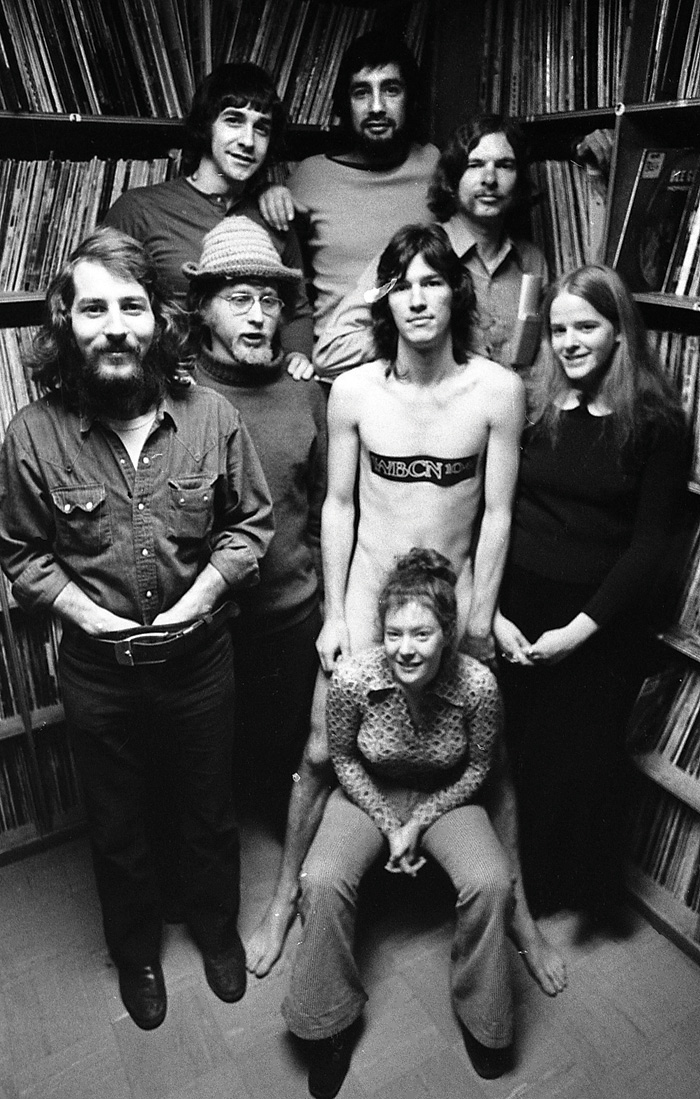WBCN and The American Revolution
If you grew up in the 1970s or 1980s within an hour’s radius of Boston, as I did, your formative years probably rocked to the soundtrack of WBCN 104.1 on your FM dial.
WBCN and The American Revolution captures that legendary rock station’s origin story. A decade in the making, this documentary now comes ten years after WBCN-FM went off the air in 2009.
As told by director Bill Lichtenstein (West 47th Street), WBCN founder Ray Riepen foresaw the future. The canned AM pop radio format of the 1950s and ’60s were giving way to more eclectic tastes. Seventy percent of music sales were albums, not singles. Meanwhile, as seen in amusing archival footage, Boston city councilmen and other “straights” complained about “a colony of unwashed, unshaven people” occupying Boston Common: the hippies. This counterculture became the perfect petri dish for Riepen’s experimental radio station, “The American Revolution.”
WBCN air staff circa 1970 in the record library at 312 Stuart Street studios in Boston. Photo: Peter Simon.
“I got the idea that in a town of 240,000 students and 84 colleges, it might be appropriate to play the music they were buying at the record stores,” Riepen deadpans. He took over a dying classical station whose call letters stood for “Boston Concert Network.” On the Ides of March in 1968, ‘BCN blasted Cream’s I Feel Free and remade itself as an underground FM station.
Wisely, Riepen let his nonprofessional DJs— plucked from local college radio stations such as Tufts—do as they pleased. They played long album cuts, mixed blues and jazz with Frank Zappa and Jefferson Airplane and mashed up soundscapes of Monty Python and Carl Orff’s Carmina Burana. They swore and smoked pot on the air.
Yet as Lichtenstein makes clear, ‘BCN was more than a mere radio station. It became a trailblazing activist itself, a kind of radical blog and Facebook of its time. It brought reporting to the streets of Boston. Announcers read excerpts from stolen FBI documents showing surveillance of student groups. The station pioneered feminist and gay programming. Its innovative message board/ hotline, called the Listener Line, informed locals of antiwar protests, helped locate missing pets and counseled suicidal callers.
WBCN and The American Revolution features many whose careers were launched by the station, such as former DJs Charles Laquidara and J. J. Jackson, who’d go on to MTV “VJ” fame, and Debbie Ullman, WBCN’s first female DJ. Lichtenstein himself began volunteering as a 14- year-old Listener Line operator in 1970 and then served as a ‘BCN newscaster and announcer. Local celebrities Noam Chomsky and Red Sox pitcher Bill “Spaceman” Lee also weigh in on the station’s impact. Ample screen time is given to lesser-known personnel: station managers, news and program directors. Early on-air personality Peter Wolf, future lead singer for The J. Geils Band, sadly does not appear directly in the film, but we do hear his voice. Similarly absent is Maxanne Sartori, a DJ who famously gave Aerosmith its first big break. (Curiously, Art New England’s publisher, Tim Montgomery, was once WBCN’s general sales manager.)
Most illuminating are the film’s surprising time capsules. We see rare stills and clips of Led Zeppelin and the Velvet Underground (shot by Andy Warhol) at the Boston Tea Party, a rock club also owned by Riepen (he also founded The Boston Phoenix) where the station broadcast early on. We hear occasional ‘BCN correspondents Jane Fonda and Abbie Hoffman reporting on issues of the day. We see images and hear audio of Bruce Springsteen’s first-ever radio interview and a profanity-strewn Patti Smith poetry-music performance live broadcast.
WBCN and The American Revolution is unremarkable and utilitarian in form, unpretentious in tone. Yet it wildly succeeds in reanimating a lost era of both radio and social history.
Perhaps rightly so, Lichtenstein’s story ends in 1974. Nixon is out. Vietnam is over. So are the station’s headier, revolutionary-minded aspirations. The offices move to the penthouse of the Prudential Tower, ushering in ‘BNC’s glitziest days. The station would introduce the Ramones, The Police, The Cars and U2 to the world. But also on the horizon would be an album-oriented rock format, the radio industry’s conglomeration, shock jocks like Howard Stern and the station’s eventual demise.
Thankfully, these latter chapters are beyond the scope of this film. WBCN and The American Revolution lingers in those halcyon days and lets them smolder. Long live the revolution. Long live rock.

